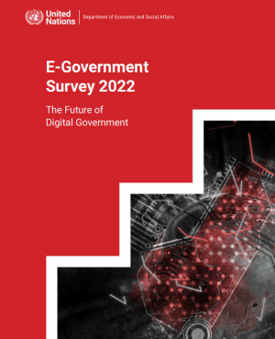UK falls to 11th place in UN E-Government ranking
The UK has been overtaken by the Netherlands, the United States, Iceland and New Zealand according to the United Nation's latest assessment of e-government around the world.
 The 12th edition of the United Nations E-Government Survey has assessed the digital government landscape across all 193 Member States - and is informed by over two decades of longitudinal research, with a ranking of countries based on the United Nations E-Government Development Index (EGDI).
The 12th edition of the United Nations E-Government Survey has assessed the digital government landscape across all 193 Member States - and is informed by over two decades of longitudinal research, with a ranking of countries based on the United Nations E-Government Development Index (EGDI).
The UK's underlying EGDI score remained more-or-less the same - with the change in ranking reflecting the improvement of others, rather than an absolute fall in assessed performance of the UK. In 2016 the UK was ranked first.
The EGDI is a composite benchmark of e-government development consisting of the weighted average of three independent component indices: the Online Services Index (OSI), the Telecommunications Infrastructure Index (TII), and the Human Capital Index (HCI).
E-Participation
The UK still ranked 6th in the world for levels of e-participation, which reflects how different countries are using online tools to promote interaction between the government and citizens.
The E-Participation Framework covers:
- E-information: Enabling participation by providing citizens with public information and access to information without or upon demand
- E-consultation: Engaging citizens in contributions to and deliberation on public policies and services
- E-decision-making: Empowering citizens through co-design of policy option and co-production of service components and delivery modalities.
As an example of global best practice, HM Courts & Tribunals Service was cited for how it was able to deploy and scale the concept of digital justice during the pandemic, holding many court proceedings online.
Future Trends
According to the 311-page report, the emergence of COVID-19 revealed just how unprepared most Governments were to deal with an extended global crisis, but over the past two years the pandemic has driven efforts to achieve a real digital government transformation in support of building a sustainable and digitally resilient society.
According to the UN report, COVID-19 forced Governments and societies to turn to digital technologies to respond to the crisis in the short term, resolve socioeconomic repercussions in the midterm, and reinvent existing policies and tools in the long term.
Virtual communication has become normalised, challenging many of the conventional approaches to working, interacting with different stakeholders, and providing services in the public sector. New operating standards have emerged that allow greater adaptability and collaboration.
At the same time governments have accelerated their digital transformation by migrating to cloud-based services such as Microsoft Office 365 and Amazon Web Services to enable greater productivity, security and collaboration.
Online video platforms have enabled community engagement to become more inclusive, and working together on virtual collaboration platforms enables government agencies and community members to communicate in real time and to share ideas and information that can enhance the quality of life or stimulate economic progress.
The restrictions surrounding COVID-19 have forced Governments to look at services delivery in a different light.
Digital platforms and applications have dramatically improved their user experience, offering greater accessibility and more personalised services provision. Only a few government services require in-person delivery; the majority can be provided fully online.
Digital identity has also become more widely accepted by governments and in many cases physical presence is no longer required for services, with online methods established for identity verification and authentication.
Finally, the pandemic has accelerated the use of analytics and AI in e-government and business, and the 2020 Global Trends report and various surveys indicate that this trend is likely to continue.






